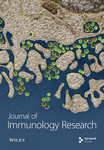Are Oxidized LDL/β2-glycoprotein I Complexes Pathogenic Antigens in Autoimmune-mediated Atherosclerosis?
Abstract
The oxidative modification of low-density lipoprotein (LDL) in the intima of arteries contributes to the initiation and progression of atherosclerotic lesions. We have previously reported that oxidized LDL (oxLDL) interacts with an endogenous plasma protein, β2-glycoprotein I (β2GPI), to form complexes and that the interaction is mediated by oxLDL specific ligands. We have also demonstrated the presence of oxLDL/β2GPI complexes in the blood stream of patients with systemic inflammatory and autoimmune diseases. These findings implicate that oxLDL/β2GPI complexes are possible atherogenic autoantigens. Autoantibodies to oxLDL/β2GPI complexes have been associated with arterial thrombosis. Further, circulating IgG immune complexes containing oxLDL and 2GPI were also detected in patients with systemic lupus erythematosus (SLE) and/or antiphospholipid syndrome (APS). Although many unanswered questions remain about the exact pathogenic mechanism(s) involved, oxLDL/β2GPI complexes may be described as metabolic products relevant in atherogenesis and as significant participants in autoimmune-mediated atherosclerosis.




